Short of murdering a guy, friendzoning is The Worst Thing™ a woman can do to him. Or so certain stories and media would have us believe. A woman who is just not into a dude is clearly a cold-hearted ice queen, especially if the dude happens to be a Nice Guy™. Why can’t she just notice him? He’s so nice! He deserves more than the friendzone!
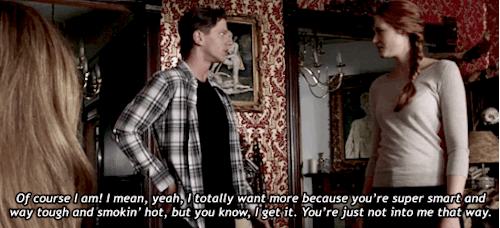
To be fair, not every male character attracted to a woman who does not reciprocate his feelings falls into this very blatant stereotype. At the same time, there is a reason why the term ‘friendzone’ has become household terminology in the past five years despite its origin being the mid 90s. Despite the plethora of ink that has been spilled on the internet and in print about why the concept is problematic (just look up ‘friendzone’ on Google), we keep seeing it crop up in our media. Movies are still being made with this as the central conflict, as CJ discussed yesterday. As much as I hate the concept, it’s not going away.
And yes, it is possible for anyone to be hurt when the object of their affection does not reciprocate their feelings. However, friendzone angst is overwhelmingly a phenomenon attached to male characters, especially Nice Guy™ characters: the kind, probably conventionally unattractive male sitting on the sidelines. He does everything ‘right’ but still never gets the girl. This leads to frustration, angry blaming, and sometimes violence (Criminal Minds has a couple of episodes about this). The story becomes one of a sexually frustrated male who believes he has earned female affection because he has performed a series of behaviors and expects to be rewarded for them. It’s a form of entitlement, specifically, male entitlement to female attention and affection.
Just to be clear, I am talking about media depictions of male entitlement, not real life. That’s a whole other can of worms. They’re intertwined phenomena, of course, because stories have the power to shape how people approach life and others. And, precisely because of that power, I want to tackle how different pieces of media engage with the friendzone and male entitlement. Is this just a trope that needs to die? Or, can we use it to create space for productive conversations?
Depiction vs. Endorsement
Let’s get this out of the way: not every use of the friendzone is an endorsement of this particular brand of male entitlement. We’re not always meant to sympathize with the aggrieved, friendzoned individual. This is the essence of depiction vs endorsemsent, a concept we talk about a lot here on the Fandomentals.
“The depiction of something sh-tty, say sexual violence against women, is not the same as the endorsement of said sh-tty thing.” (source)
In other words, a piece of media can portray a character behaving in a certain way without implying they’re correct or that their behavior is appropriate. At the same time, in the absence of context or commentary that challenges the depiction, the audience will assume that depiction is endorsement. This is even more probable when other storytelling elements are present. Is the character a primary character or protagonist? Audiences are much more likely to assume endorsement if so, though not always. Antagonists who behave this way, on the other hand, like Kilgrave from Jessica Jones, are much more likely to be questioned.

Is the character’s behavior portrayed sympathetically? Are we intended to feel for them? Audiences are more likely to assume narrative endorsement of a sympathetic character, though not always. On Supergirl, Mon El’s treatment of Cat Grant’s secretary Miss Tessmacher is not meant to be sympathetic, and, in fact, Kara calls him out on it, so assuming endorsement reads against the text. At the same time, woobification of villains happens for a reason. Sometimes audiences prefer to sympathize with characters who are not presented sympathetically in canon, and this can happen with friendzoned characters, too. Still, audience interpretation ≠ narrative endorsement, so it’s important to distinguish between the two.
One must also look at the narrative framing of the friendzone reaction. Is it treated as romantic or true love? Is he ‘waiting for her’ or ‘just lonely’ (Passengers)? Romanticizing the male character’s entitlement frequently generates sympathy, which, in turn, implies endorsement, though not always. (I’m a broken record, I know.) Petyr Baelish in A Song of Ice and Fire (ASoIaF) romanticizes his relationship with Catelyn, but we’re not meant to sympathize with his interpretation (I’ll come back to this later).
Finally, thematic context must be taken into account. Is the narrative specifically crafted around sidelined Nice Guys™? Is male rejection the focus or female agency and consent? The former theme is much more likely to endorse friendzoned entitlement over the latter, but not necessarily. It’s also important to note that a narrative may generally endorse a specific character and their perspective, but not their every action. Such nuance may be lost on the audience without the narrative itself being to blame.
Positive Endorsement of Non Entitlement
Not all uses of the friendzone trope are created equal. Very rarely, a piece of media explicitly endorses male characters who respond to the friendzone in surprisingly non-entitled ways.
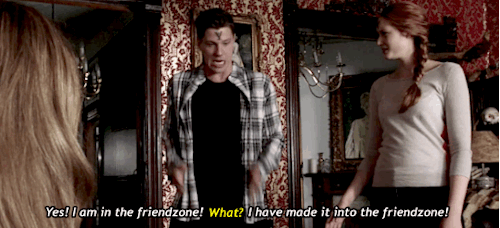
In the web series Carmilla, Wilson Kirsch (aka, Kirsch) has all the makings of a stereotypical friendzoned Nice Guy™. He’s a frat boy epitome of bro culture as well as kindhearted and loyal. He genuinely cares about protecting the women of Silas University and is a bit of a lost puppy given how naïve (and stupid, lets admit it) he is. In Season 2, he develops an unrequited crush on Danny Lawrence. She still has feelings for the protagonist Laura Hollis, so she rejects him. The show even sets up the conversation for the audience to expect entitled frustration.
Kirsch: “I was just wondering… am I in the friendzone?”
Danny: “Kirsch, are you— are you seriously asking me this? Fine. Fine, if that’s the only way that you can think of women, then yes. You have been friendzoned.”
Kirsch defies all expectation by being happy. Being her friend is not an insult to Kirsch, it’s a privilege. Does he want more? Yes, and he admits it. And, he likes her as a person so much that he values her friendship apart from any lack of reciprocation of feelings. He’s just happy he gets to hang out with her. Carmilla flipped the friendone on its head by making it something positive.
Not every character needs to be happy about the lack of interest to avoid falling into entitlement. For every Kirsch, there are a handful of Winn Schott Jrs and James Olsens, characters who evince pain over the rejection and need space to cope with their feelings. Winn’s arc in Supergirl Season 1 is one of my favorites precisely because of how it handled his unrequited feelings for Kara. Like Carmilla, Supergirl sets Winn up as the Nice Guy™ best friend who has supported Kara from the beginning. When Winn’s profession of love came at the tail end of his confrontation with his murderous, mentally ill father, many theorized that her subsequent rejection would turn him evil. It’s the expected storyline for a friendzoned Nice Guy™: guy turns dark after female rejection, her end game profession of love saves him, and he is rewarded for acting out. (*hrrk*)
Instead, Supergirl veered left. Winn’s need for space got awkward for an episode and a half, and Kara made mistakes in how she handled it, but they accepted both their feelings and the other person’s and moved on. He did not blame her for leading him on or whine about how he deserved her attention because he was such a good friend. He coped with his feelings from a distance and then moved back into her sphere as a friend when he felt ready. Zero friendzone entitlement.
The same goes for James Olsen after Kara broke up with him. Don’t get me wrong, I’m still salty about how quickly that fell apart given that I spent the entire first season shipping them (and would be happy if that were end game). At the same time, the show handled the aftermath with the same delicacy as they did with Winn. James took some time to himself to grieve, then returned to his friendship with Kara. James and Winn even joke about it now with zero malice.

The similarity clearly underscores the writers’ desire to endorse this kind of behavior as a reaction to romantic rejection versus the friendzone stereotype. Note also that Alex tells Kara she’s been put in the friendzone with James in 1.04 (a low point in the show for me, actually, since I hate the term friendzone), but Kara reacts neither with entitled frustration and blame, nor with rejecting his friendship altogether. Instead, despite Alex’s advice to chase down James, Kara chooses to be more honest about her feelings when appropriate (at the end of the season) and see if he reciprocates.
Both Carmilla and Supergirl find ways to reinterpret the friendzone against the grain. Kirsch appreciates the positive aspects of it. Winn, James, and Kara accept it as something that, while painful, ought to be dealt with in mature manner that does not blame the other person. None of these characters react with entitlement but rather with an understanding that their feelings are their own responsibility, not the other person’s.
Positive Endorsement of Male Entitlement
It always comes back to Game of Thrones (GoT) doesn’t it? It’s a cultural touchstone, after all, and one with a wide array of problematic elements, implications or otherwise, many of which we’ve talked about at length on this site. But what would a discussion of the friendzone and male entitlement be without Ser Hilariously Friendzoned himself (as our book snob glossary likes to call him): Jorah Mormont.
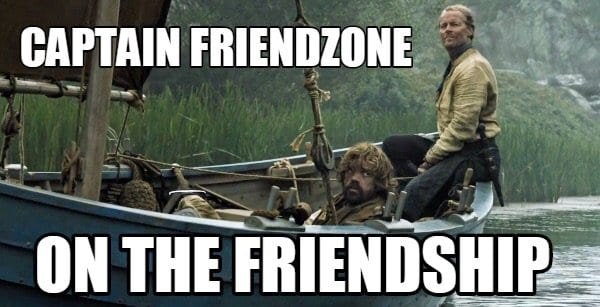
Jorah had a thing for Daenerys since the beginning of the show, but his crush grew to creepy stalker peak friendzone levels when she birthed her dragons. He spent several seasons mooning after her, bickering with any male that got within three feet of her, attempting to sideline them, and going on quests to earn her love after she rejected him. He even was willing to risk an outbreak of an infectious disease just to tell her he loved her. That’s true love, people. He’d gladly give her greyscale if it means touching her bare hand. He feels entitled to her good opinion of him because of his romantic attachment and will do whatever it takes to make her change her mind about him.
It’s difficult to argue that we’re not meant to sympathize with Jorah’s unrequited love. The narrative rewards him for his behavior whenever it can. Dany relents her previous decision to send him away after he and Daario “rescue” her from Vaes Dothrak. The turn from “Don’t ever presume to touch me again or speak my name” (4.08) to her reaching out and touching him (5.10) could not be more clear. His persistent love and devotion to her has “won her over” and, while she still may not return his romantic feelings, she recognizes his worth and values his presence. He’s a sympathetic, romanticized protagonist rewarded for his unwillingness to accept her rejection struggle against the friendzone.
Jorah’s depiction as the loyally friendzoned bff also fits into an overall pattern on the show that garners sympathy for underappreciated Nice Guy™ protagonists.

Heck, Tyrion’s ‘arc’ for the past two seasons on the show has been him learning how awesome and underappreciate he is, then telling other people about how awesome and underappreciated he is. He even gets offered free sex for being awesome and underappreciated. Because Nice Guys™ deserve female attention, even if they ultimately reject it because they are just that Nice™.
Even supposed antagonists get romanticized versions of their friendzone stories on Game of Thrones, just ask Batfinger, aka Petyr Baelish. To hear him tell it, he was in love with Catelyn Stark since they were children, she “gave him her maidenhead”, and then mean Hoster Tully got in the way of their Tru Wuv by marrying Cat off to Ned. They’re starcrossed lovers who never quite found each other again, and he’s protecting Sansa purely out of his devotion to Cat.
Since the show consistently shafts Catelyn’s perspective, this version of events is never challenged. So, while viewers of the show might think he is a bit of a creeper about Sansa, they have no way of actively challenging his narrative regarding his and Cat’s romantic history. He’s creepy, but out of grief for a former lover that he’s been trying to replace his whole life, first with her sister, and now with her daughter. How romantic. (*hrrk*)
Depiction of Male Entitlement Without Endorsement
Alright, so the show has some issues with male entitlement, but aren’t they rooted in the books? Unsurprisingly, my answer is no. The adaptation of these particular storylines actually highlights how much the showrunners got wrong about Martin’s depiction of male entitlement in ASoIaF. Rather than an object of humor or sympathy, Jorah Mormont in the books is punished for his behavior toward Dany. Yes, she allows him to kiss her at one point, but when she realizes she does not feel anything for him, she calls him out on it. She confronts him about his continued attempts to isolate her from other males as well. Dany, the actual protagonist of her storyline, does not endorse his behavior toward her nor do any of the other characters. Only Jorah believes himself in the right, and his stubborn insistence on the rectitude of his behavior serves only to characterize him negatively.
Now, we can bicker about what his ‘true’ motivations were and whether or not he felt true love for her or merely sexual entitlement, but I’d rather not. The bottom line is that he does act as if he is entitled to her good opinion. When confronted with his own betrayal, he demands that Dany forgive him. When refused, he does not respond by zealously protecting her good name from being mocked in a brothel (warning, video is nsfw). The next time we see him in the books, he has purchased the services of a sex slave with remarkably similar physical features to Dany herself.

He’s not so much hilariously friendzoned as he is given clear boundaries regarding his behavior that he repeatedly transgresses and is punished for. That she’s a young teenager and he’s in his mid-forties underscores the gross entitlement factor. And he’s a former and unrepentant slaver. He’s neither sympathetic nor romanticized, so any endorsement of his ‘friendzone’ story requires reading against the narrative. Nor do the books thematically value underappreciated Nice Guys™ the way the show does. If anything, they go out of their way to depict how damaging male entitlement is.
Take Petyr Baelish. As I mentioned, GoT romanticizes his childhood love for Cat without challenging it. ASoIaF, on the other hand, repeatedly undermines his version of events, mostly through Catelyn’s perspective chapters. He tells Sansa she “gave him her maidenhead”; Cat ruminates about Ned doing so. Now it is possible that Petyr believed he was in bed with Cat instead of Lysa at the time, but subsequent life events would have robbed him of this notion pretty quickly (e.g., the second time he slept with Lysa and she wasn’t a virgin, plus she can’t stop talking about giving him her maidenhead that night). So, when he tells Sansa it was Cat in his bed, he lies.
He claims Cat loved him; Cat discusses him as a little brother figure who felt more for her than she did for him. In fact, she seems to have thought little of him in the time span between her marriage to Ned and the events of A Game of Thrones. Theirs is no starcrossed lovers story, at least not in Cat’s mind.
“He was my father’s ward. We grew up together in Riverrun. I thought of him as a brother, but his feelings for me were … more than brotherly. When it was announced that I was to wed Brandon Stark, Petyr challenged for the right to my hand. It was madness. Brandon was twenty, Petyr scarcely fifteen. I had to beg Brandon to spare Petyr’s life. He let him off with a scar. Afterward my father sent him away. I have not seen him since…He wrote to me at Riverrun after Brandon was killed, but I burned the letter unread. By then I knew that Ned would marry me in his brother’s place.”–A Game of Thrones, Catelyn IV
Petyr, on the other hand, used his so-called love for Cat as license to be a horrible person. He brags about having taken both Tully girls’ maidenheads. He takes advantage of Lysa’s feelings for him, manipulating her (and through her, Jon Arryn) to gain a position of power at court and avenge his wounded pride. Once there, he uses his cunning and intellect to blackmail and further manipulate himself into a position of further power. He preys on Lysa’s fear and she murders her husband, which he then uses to convince her to write Cat a letter blaming the Lannisters, the selfsame letter that begins A Game of Thrones.
Petyr uses his position as Master of Coin to gain a lordship that finally puts him on equal footing with Cat in social standing. He ‘aids’ (and then betrays) Ned in his political schemes both to ingratiate himself with Cat and to bring about Ned’s downfall. He assists in the planning and execution of Joffrey’s assassination to get Sansa. Once in his power, he manipulates, isolates, gaslights, and sexually grooms her, claiming to be making her a player but also trying to make her his pawn. He kills his wife after she catches him kissing Sansa, who is thirteen years old. He contributes to the systematic poisoning of a young child under his care.
This isn’t to say Petyr is a mastermind puppeteer controlling everyone, far from it. Other characters behave in ways he cannot entirely predict (e.g., Lysa). But he is an opportunist, and he is goal oriented. He is not an “agent of chaos” as the TV show would have him. He’s cunning and ruthless, and also petty. Murder, assassination, manipulation, sexual exploitation, poisoning, blackmail, betrayal, economic and political chaos—these are not goals in and of themselves for Petyr, but means to gain the only thing he ever wanted:
“Only Cat.”—A Storm of Swords, Sansa VII
And, failing Cat, an appropriate surrogate, like her teenaged daughter. The one thing he never considers with any depth? Whether Cat (or Sansa) wants him. As a child, we may excuse his infatuation and foolhardy challenge of Brandon Stark as misguided and impulsive. Even if he may have mistakenly believed Cat loved him, fifteen years of silence ought to have communicated her desire to move on. She was happily married to her husband, had children. And Petyr still dreamed about her, held grudges against her father and the Starks for taking what he wanted away.
When you realize everything he did was out of a desire to obtain Cat, Petyr’s decades long fixation twists from youthful infatuation into something much darker. If you’ll pardon the modern parlance, he is the embodiment of male entitlement to female affection gone dark and twisted. He believed he deserved Cat because of his love for her, was friendzoned by both Cat and her father, and never got over it. He may have loved her once, but being willing to assist in murdering a teenage boy to gain access to a teenage surrogate for your thwarted affections is not romantic. That’s fucked up.
It’s a take down of the courtly love tradition and a commentary on male entitlement that the show misses entirely in it’s ‘adaptation’ of Petyr’s story. In essence, Petyr’s feelings of entitlement to Cat fucks over everything in Westeros. Had he moved on instead of manipulating Lysa into murdering her husband and writing the letter to Cat warning her against the Lannisters, none of what happened in the books would have transpired. I know that it had to happen because that’s the plot, but the fact that the root of the instigating event of the first novel is male entitlement fascinates me on a thematic level. It may not be the main takeaway from the books, but it’s an idea to be explored: Petyr’s male entitlement creates all of Westeros’ current chaos.
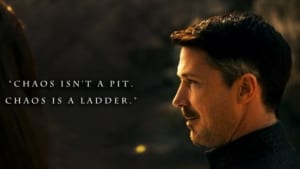
So, Does the Friendzone Need to Die?
If by that question I mean does the concept need to fade away into oblivion? Yes. Romantic rejection hurts like hell; I spent the vast majority of my teenage and early adult years as the unrequited lover of people who had no interest in me. I get it. But I never thought about it in ‘friendzone’ terms. Never felt entitled to the other person’s affections just because I was their friend and we had good rapport. Friendzone entitlement needs to die.
But, when it comes to media depictions, then I’d say no, the friendzone doesn’t need to die because media is one of the ways that we combat harmful concepts in our society. What needs to die is the positive endorsement of male entitlement in media, not the depiction of male entitlement in and of itself. If anything, we need more stories of male characters who respond to being ‘friendzoned’ either with positivity (like Kirsch) or with reasonable pain and acceptance (like James and Winn). Responding to lack of romantic interest with blame and entitlement is so ingrained in our cultural storytelling at this point that we need positive alternatives if we’re going to combat its normalization.
We also need characters like Jorah Mormont and Petyr Baelish from the ASoIaF novels who model the destructive nature of male entitlement. Jorah’s mixture of paternalism and infantalization prevents him from respecting Dany’s agency and choice in increasingly problematic ways. Call it love or lust, his idealization of Dany leads him to hire a sex slave to sate his thwarted desires. Petyr’s entitlement is at the core of his entire arc. Not all of the consequences are foreseeable—he did not plan the War of the Five Kings even if Lysa’s letter to Cat is the spark. Nevertheless, he murders, poisons, blackmails, and exploits others to gain what was denied him, culminating in the assassination of the king and the manipulation and sexual grooming of a teenage girl as a replacement for his lost ‘love.’
Yes, I know #NotAllMen. Not all entitled men are rapists or murderers or unrepentant slavers or serial blackmailers. Many are clueless as to the source of their own biases and reactions because their culture has wrongfully enforced the idea that women exist to please men.
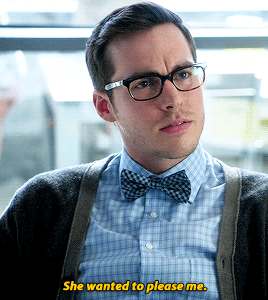
But, cautionary tales like Petyr and Jorah are still useful. Male entitlement to female affection may not always be dark and twisted, but neither is it positive. It’s not even neutral. The belief that someone else owes you affection/love/sexual favors because of your behavior should never be endorsed. No matter what your gender is (or the other person’s gender), one ever owes you for being a nice person or a good friend, period. I’m done with this these kinds of stories. Write the ‘friendzone’ if you must, but challenge it or undermine it. The endorsement of male entitlement to affection, whether by romanticizing it or garnering sympathy for it, needs to stop.

